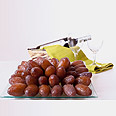
Israeli dates take world by storm
Sold in six continents, Israeli Medjool variety enjoys 35% global market share. Total date exports expected to reach $60 million in 2012
"Today, Israeli dates can be bought in six different continents," says Chezi Almog, marketing vice-presidents of Hadiklaim, Israel's leading palm growers cooperative.
"We are licensed suppliers of leading retail chains such as Tesco and Marks & Spencer. The price of our date reaches up to €20 ($26) per kilogram (2.2 pounds), and we lead the world's premium market."
Some 8 million tons of dates are grown in the world every year. About 95% of them are eaten "under the tree" and don’t even reach the market, explains Hadiklaim's accountant, Ramy Sharaby.
Of the 5% that are marketed, 90% of the dates are used for industrial purposes – Cakes, sauces, jams, etc – and another 5%, about 100,000 tons a year, are directed to the premium eating market.
"In this small market, the lead player is the Medjool, and its average price is 10 times higher than the price of a simple date," says Sharaby. "We have a share of about 35% of the Medjool global market."

Date harvest includes 30,000 tons of nine varieties (Photo: Ziv Reinstein)
This wasn't always the case. Until 1982, dates were grown in Israel in several areas, and semi-state owned company Agrexco was in charge of marketing. Four groups of palm growers were unsatisfied with the marketing efforts and decided to unite and set up a joint organization, Hadiklaim. Almog, who was the manager of the Arava packing house, was appointed marketing vice-president.
"After we began planting in the Arava region, the amount of dates increased and the marketing was insufficient for the growth forecast," he says. "Agrexco's methods were unsuitable and we felt that we had to find the niche which matches our product. We are experts on dates."
Hadiklaim's initial goal was to improve the marketing and the growers' economic dependence.
Until 1991, marketing efforts abroad were still in the hands of Agrexco, while the association dealt with the Israeli market and local growers. Following a rift in the relations with Agrexco, new rules were set between the two organizations. This is when the palm growers began exporting their own produce.
Since the Hadiklaim's establishment, the export of dates has skyrocketed by more than 1,000% in financial terms. "In 1982 we exported about 1,500 tons of dates for $4 million. In 2011 we went up to 7,000 tons for $60 million," says Almog.
This year, the organization estimates, the harvest will include 30,000 tons of nine varieties of dates, led by the Medjool and followed by Barhi dates with 3,500 tons, and Deglet Noor and Hayany dates with 3,000 tons each.
About 50% of the date harvest in Israel is exported, but due to its high quality it is responsible for 75% of growers' income. Israeli dates reach almost every country in the world.
How do you deal with boycotts against Israeli agricultural produce?
"The boycott is not presented as a boycott against us," says Almog. "We are approached by customers asking for Israeli produce only, and we supply them with the produce according to our commitment. Our work is legal and we don't deceive any of our customers."
Hadiklaim takes pride in the fact that it works with some 100 growers, including 60 cooperative enterprises and kibbutzim and dozens of private growers.
The date harvest season begins in late July and ends in October. There are three record sale periods: Rosh Hashana, Tu B'Shvat and Passover, but the fruit can be found on store shelves all year long.
How much do we eat compared to our neighbors?
"The average Israeli eats about 1 kilogram of dates a year, but our neighbors in Arab countries eat about 10 kilograms a year, so we still have a long way to go."
This year Hadiklaim began exporting Palestinian produce from the Jericho area to global markets, boasting that even the neighboring farmers favor the experienced Israeli marketing machine.










